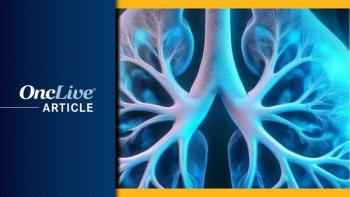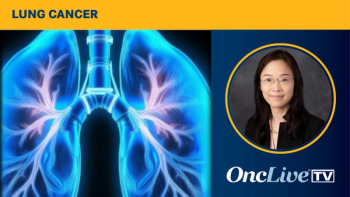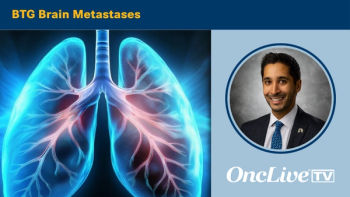
Osimertinib/Bevacizumab Combination Fails to Prolong PFS in EGFR T790M+ Lung Cancer
Key Takeaways
- Osimertinib combined with bevacizumab did not extend PFS compared to osimertinib alone in EGFR T790M-mutated adenocarcinoma patients.
- The combination arm showed a higher overall response rate but did not improve time to treatment failure or overall survival.
The combination of osimertinib and bevacizumab did not prolong progression-free survival in patients with advanced adenocarcinoma who had EGFR T790M mutations compared with osimertinib alone
The combination of osimertinib (Tagrisso) and bevacizumab (Avastin) did not prolong progression-free survival (PFS) in patients with advanced adenocarcinoma who had EGFR T790M mutations compared with osimertinib alone, according to findings presented by Yukihiro Toi, MD, during the 2020 European Society of Medical Oncology (ESMO) Virtual Congress.1
Toi, from the West Japan Oncology Group 8715L, reported that median PFS in the combination arm was 9.4 months versus 13.5 months for the monotherapy arm (HR, 1.44; 95% CI, 1.00-2.08; P = .20). The investigators did observe that the overall response rate (ORR) was higher in the combination arm at 71.8% (95% CI, 50.9%-81.4%) compared with the monotherapy arm 55.0% (95% CI, 37.4%-69.3%).
Osimertinib is the current standard treatment in patients with non–small cell lung cancer who harbor an EGFR T790M mutation, said Toi. Preclinical studies have demonstrated the potential benefit of the combination of an EGFR tyrosine kinase inhibitor and an anti-VEGF inhibitor in a mutated model.2 Single-arm studies evaluating osimertinib with ramucirumab (Cyramza) demonstrated 11.0 months of median PFS in patients with a EGFR T790M mutation.
After a lead-in phase that enrolled 6 patients who received fixed-dose osimertinib and bevacizumab, phase 2 included 81 patients who were stratified by gender, number of prior chemotherapy treatments, and institution. Patients were randomized to receive either osimertinib and bevacizumab (n = 40) or osimertinib alone (n = 41) until disease progression.
Patients were eligible for the study if they received a diagnosis of advanced lung adenocarcinoma, evidence of EFGR-TKI resistance, acquired EGFR T790M mutation, and an ECOG performance status of 0-1. The primary end point was PFS determined by investigator and secondary end points were ORR, time-to-treatment failure, overall survival (OS), and safety.
Baseline characteristics were similar between the 2 arms. The median age was 70 years in the osimertinib-only arm and 68 years in the combination arm. In the monotherapy arm, 41% were never smokers and 53% were never smokers in the combination arm. Sixty-three percent of patients in the monotherapy arm and 83% in the combination arm were diagnosed clinical stage IV disease. Toi noted that in the combination arm, 20% had received prior anti-VEGF treatment compared with 10% in the monotherapy arm. He reported that 25% of patients in the combination arm compared with 17% in the monotherapy arm had received more than 1 prior cytotoxic chemotherapy.
“In both arms, almost half of the patients [46% and 45%, respectively] with EGFR T70M were diagnosed using peripheral blood samples,” Toi said.
Median follow-up time in the combination arm was 16.0 months (range, 2.4-22.6) and 16.2 months (range, 2.8-24.0) in the monotherapy arm. At data cut-off, 17 patients were on treatment in the osimertinib-only arm, and 9 patients were on treatment in the osimertinib and bevacizumab arm.
Subgroup analysis was similar for each arm. Overall, Toi said among patients who had prior anti-VEGF therapy, patients in the monotherapy arm had better median PFS rates (15.1 months) compared with patients in the combination arm (4.6 months). “Patients in the osimertinib and bevacizumab combination arm tended to have shorter progression-free survival rates than the other group,” Toi said.
The time to treatment failure was longer in the monotherapy arm than the combination arm at 11.2 months versus 8.4 months, respectively [stratified HR, 1.54 (95% CI, 0.90-2.64; P = .12)]. Median OS was similar between the 2 arms with the monotherapy arm at 22.1 months compared with the combination arm, which was not reached [stratified HR, 1.02 (95% CI, 0.43-2.44; P = .06)].
The most common grade 1/2 adverse effects (AEs) observed in the combination arm were proteinuria and decreased platelet count. However, among grade 3 AEs, proteinuria and hypertension were significantly higher (P <.05) in the combination arm, whereas anemia was significantly higher (P <.05) in the osimertinib-alone arm. About 10% of patients in both arms experienced interstitial lung disease (grade 1/2).
References
- Toi Y, Akamatsu H, Hayashi H, et al. A randomized phase II study of osimertinib with or without bevacizumab in advanced lung adenocarcinoma patients with EGFR T790M mutation (West Japan Oncology). Presented at: 2020 ESMO Virtual Congress. September 19-21, 2020. Abstract 1259O.
- Naumov GN, Nilsson MB, Cascone T, et al. Combined vascular endothelial growth factor receptor and epidermal growth factor receptor (EGFR) blockade inhibits tumor growth in xenograft models of EGFR inhibitor resistance. Clin Cancer Res. 2009;15(10):3484-3494. doi:10.1158/1078-0432.CCR-08-2904



































